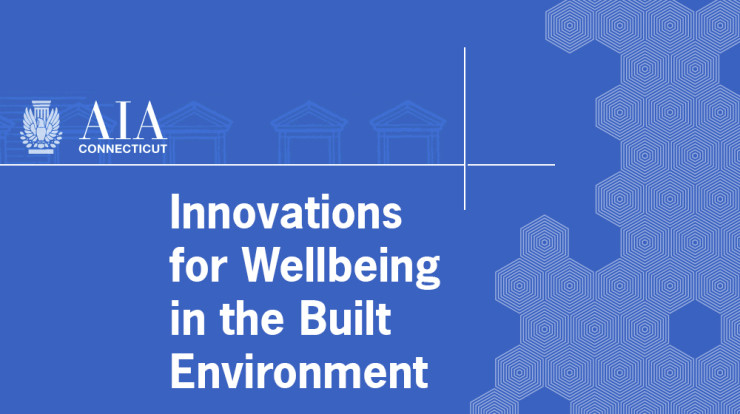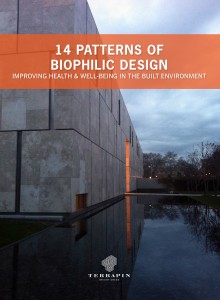

News
AIA Connecticut Hosts Workshop on Well-Being
Catie Ryan
Share
Learn more about our biophilic design work and services by emailing us at [email protected] and reading our reports, 14 Patterns of Biophilic Design and The Economics of Biophilia. Follow the conversation on twitter: @TerrapinBG | #14Patterns.
On July 8, AIA Connecticut is hosting a workshop “Innovations for Well-Being in the Built Environment”. I am looking forward to participating in a panel discussion with Brad Bevers, AIA, Executive Director, Facilities Design and Construction at the Yale-New Haven Health System, and Robin Guenther, FAIA, Sustainable Health Care Design Leader, Perkins + Will. Ross Spiegel, FAIA, will moderate the workshop.

14 Patterns of Biophilic Design
© 2014 Terrapin Bright Green
Today, more than ever, architects and engineers are challenged to develop practical, innovative strategies to address complex requirements for healthy and sustainable places. At Terrapin we encounter these challenges and opportunities on a daily basis and I am excited to be able to share concepts and science of biophilic design with AIA-CT.
This workshop-style interactive program is intended to highlight three important dimensions of successful innovation where sensitivity to occupant well-being drives design choices. We will focus on:
- Programming and form: developing design requirements and strategies in conjunction with owners, with occupant well-being in mind.
- Adapting practice: steps toward evolving core practice capabilities to successfully address sensitive – and sensible – programmatic requirements.
- Delivery through construction: Implementation tools and frameworks for leading teams toward client acceptance, occupant satisfaction, and moments of delight.
For more information and to Register, visit AIA Connecticut. Hope to see you on July 8th!
Catie Ryan
Catie is the Director of Projects at Terrapin and a leader in biophilic design movement. With a background in urban green infrastructure, Catie's interest lies in systems thinking to address human health and sustainability challenges at each scale of the built environment.
Topics
- Environmental Values
- Speaking
- LEED
- Terrapin Team
- Phoebe
- Community Development
- Greenbuild
- Technology
- Biophilic Design Interactive
- Catie Ryan
- Spanish
- Hebrew
- French
- Portuguese
- Publications
- Occupant Comfort
- Materials Science
- Conference
- Psychoacoustics
- Education
- Workshop
- Mass Timber
- Transit
- Carbon Strategy
- connection with natural materials
- interior design
- inspirational hero
- biophilia
- economics of biophilia
- Sustainability
- wood
- case studies
- Systems Integration
- Biophilic Design
- Commercial
- Net Zero
- Resorts & Hospitality
- Energy Utilization
- Water Management
- Corporations and Institutions
- Institutional
- Ecosystem Science
- Green Guidelines
- Profitability
- Climate Resiliency
- Health & Wellbeing
- Indoor Environmental Quality
- Building Performance
- Bioinspired Innovation
- Biodiversity
- Residential
- Master Planning
- Architects and Designers
- Developers and Building Owners
- Governments and NGOs
- Urban Design
- Product Development
- Original Research
- Manufacturing
- Industrial Ecology
- Resource Management
- Sustainability Plans
- Health Care
- Carbon Neutrality


